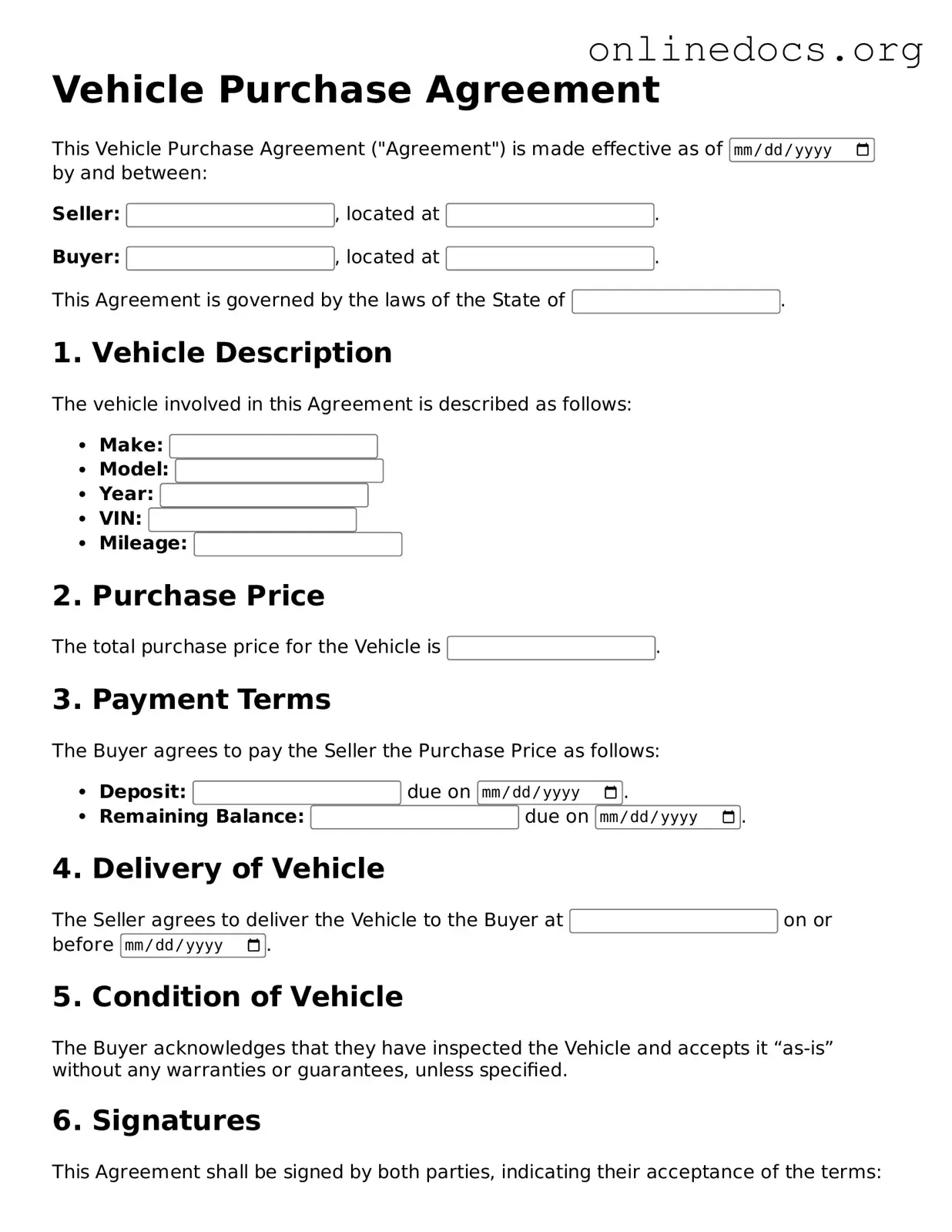The Bill of Sale is a document that serves as proof of the sale of a vehicle. It includes details such as the buyer and seller's names, the vehicle's identification number (VIN), and the sale price. Like the Vehicle Purchase Agreement, it formalizes the transaction and can be used for registration purposes. Both documents protect the interests of the buyer and seller by providing a written record of the agreement.
The Lease Agreement is similar to the Vehicle Purchase Agreement in that it outlines the terms under which a vehicle is used. While a purchase agreement transfers ownership, a lease agreement allows the lessee to use the vehicle for a specified period in exchange for regular payments. Both documents detail responsibilities, payment amounts, and conditions for termination or renewal.
A Loan Agreement is another document that shares similarities with the Vehicle Purchase Agreement. This document outlines the terms of a loan taken out to finance the purchase of a vehicle. It includes details about the loan amount, interest rate, repayment schedule, and consequences for default. Like the purchase agreement, it is a legally binding contract that protects both parties involved.
The Title Transfer Document is essential when a vehicle changes ownership. This document is filed with the state to officially record the transfer of title from the seller to the buyer. Similar to the Vehicle Purchase Agreement, it requires signatures from both parties and includes vehicle details. It ensures that the buyer has legal ownership and can register the vehicle in their name.
The Purchase Order is commonly used in business transactions, including vehicle purchases. It outlines the buyer's intent to purchase a vehicle and includes specifications such as model, quantity, and price. Like the Vehicle Purchase Agreement, it serves as a formal request and can lead to a binding contract once accepted by the seller.
The Service Agreement may not seem directly related, but it often accompanies vehicle purchases, especially for maintenance or warranty services. This document outlines the terms of service provided by the seller or a third party. Similar to the Vehicle Purchase Agreement, it details obligations, payment terms, and duration of service, ensuring both parties understand their responsibilities.
The Escrow Agreement is used in transactions where a third party holds funds until certain conditions are met. In vehicle purchases, it can protect both the buyer and seller by ensuring that payment is made only when the vehicle is delivered and accepted. This document is similar to the Vehicle Purchase Agreement in that it creates a secure environment for completing the transaction.
The Warranty Document provides assurances regarding the vehicle's condition and performance. It outlines what is covered, the duration, and how claims can be made. While the Vehicle Purchase Agreement focuses on the sale itself, both documents work together to protect the buyer's interests and ensure they receive a reliable vehicle.
The Insurance Policy is crucial for vehicle ownership and is often discussed during the purchase process. It outlines coverage details, premiums, and conditions. Like the Vehicle Purchase Agreement, it is a contract that protects the buyer's investment and ensures financial security in case of accidents or damages.
In addition to these documents, a Last Will and Testament form serves as an essential legal tool for individuals to express their final wishes about their assets and dependents. This important document ensures that possessions are distributed according to one's preferences, protecting the future of loved ones, and can be explored further at legalformspdf.com.
Finally, the Financing Agreement is similar in that it outlines the terms under which a buyer finances the purchase of a vehicle. It details the loan amount, interest rate, payment schedule, and other conditions. Both the Financing Agreement and the Vehicle Purchase Agreement are essential for ensuring that all parties understand their financial commitments and obligations in the transaction.
